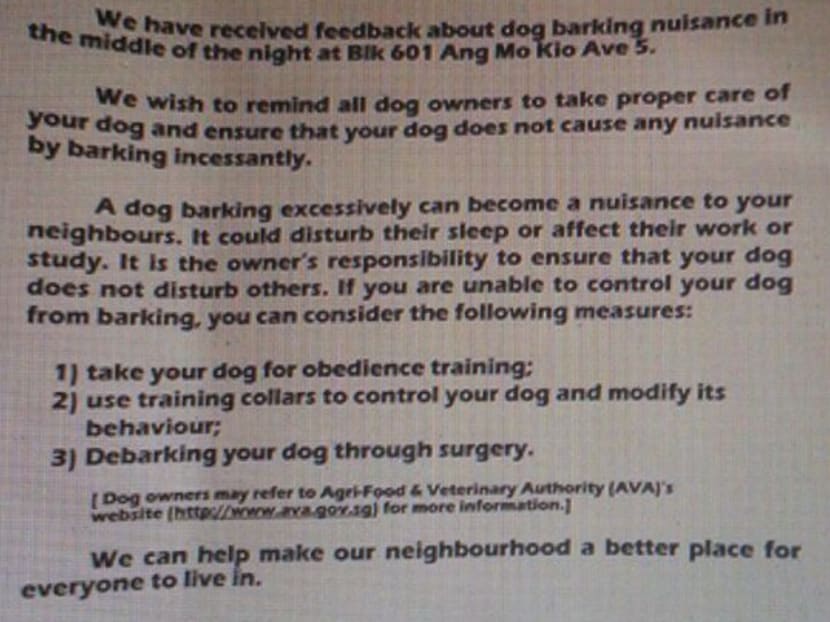Outcry after HDB suggestion to debark noisy dogs
SINGAPORE — The Housing and Development Board (HDB) has apologised for “causing anxiety” to dog owners and removed a HDB notice that listed debarking as an option to manage excessive dog barking, after the notice drew an outcry from animal welfare groups and animal lovers.

A photo of the HDB notice, posted on Action for Singapore Dogs' Facebook page Photo: Facebook, Action for Singapore Dogs
SINGAPORE — The Housing and Development Board (HDB) has apologised for “causing anxiety” to dog owners and removed a HDB notice that listed debarking as an option to manage excessive dog barking, after the notice drew an outcry from animal welfare groups and animal lovers.
Noting that the notice “does not reflect accurately the position we take”, the HDB said: “The notice had meant to seek the assistance of dog owners to help manage the issue of excessive dog barking at an Ang Mo Kio block, arising from complaints received. We agree it should have been handled more sensitively, and the notice has since been taken down.”
The HDB added that when residents complain about excessive dog barking, “we have always advised and counselled dog owners to manage their pets’ barking and behaviour through obedience training”.
“Debarking should only be considered by pet owners as a last resort when all other measures, especially training, are ineffective and only if the dog owner considers it an option.”
The notice, issued by the HDB’s Ang Mo Kio Branch on Friday (Aug 22), lists the surgical procedure — in which a section of a dog’s vocal chords is removed to reduce the volume of its bark — alongside two other options available to owners: Obedience training and the use of training collars.
Various animal welfare groups criticised the suggestion to debark dogs.
Action for Dogs Singapore (ASD) posted on its Facebook page that while it agreed with the basic premise of the notice that consideration for neighbours is “paramount”, it “strongly objects to point #3 of ‘debarking your dog through surgery’”.
“This is an extremely cruel and painful procedure of removing the vocal chords which can cause constant physical pain. A dog also barks when it is in a stressed or anxious mode, and not hearing the dog does not mean the dog is in a stable state of mind. That can lead to further behavioural issues such as aggression and separation anxiety,” ASD said.
The group added: “Such recommendations should not be publicly put out without due advice from experts as it sets a wrong mindset that such solutions are ethical or safe.”
The Society for the Prevention of Cruelty to Animals (SPCA), Singapore issued a statement saying the recommendation to debark pet animals is “disappointing”
“The surgery usually leaves the animal with something between a wheeze and a squeak, and we find that highly objectionable and surely at least mentally cruel to the animal,” said SPCA’s Executive Director Corinne Fong. She noted that countries such as the United Kingdom have expressly prohibited debarking.
Ms Fong also took issue with the suggestion to use a training collar, saying the electric collar “is already considered illegal as an abusive tool in countries such as Finland and Wales and in the Canadian province of Quebec”.
“Shock or electric collars are devices placed around a dog’s neck connected to handheld transmitters which remotely deliver varying levels of electric shock to the dog’s neck. They are designed to provide an aversive stimulus to a dog as a punishment or correction from its trainer or owner, and cause the animal pain and fear,” she said.
When contacted, Dr Heng Yee Ling from Mount Pleasant Animal Medical Centre (Redhill) said the clinic does not debark dogs “because there are better and more humane ways to control the dog, like behaviour training”.
Many respondents to ASD’s post on Facebook felt that the recommendation was inhumane, or did not address the root cause of the issue: That of owners being unable to discipline their pets.
Facebook user Rebekah Charmixy Jay wrote: “The issue is the owners ability to discipline and train their dog, not the dog having the ability to bark.”
Another user, Margaret Mchardy, said, “Appalling. How can a dog be happy without the ability to express itself fully?”
Facebook user Amos Ong, however, felt that the matter was blown out of proportion. He wrote: “It’s not a directive, it’s a suggestion...No one is forcing you to go with option 3. You make your own choice based on your individual situation to resolve the existing nuisance issue.”






